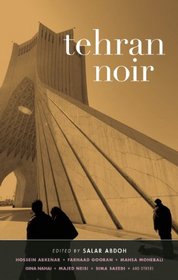This collection of fifteen short stories by Iranian authors may not always be easy to read, but that doesn't matter. What does matter is that Tehran Noir is not only a solid collection of crime stories, but it's also an illuminating depiction of day-to-day life in Iran complete with its religious, political, and racial tensions.
In Iran, the number thirteen is considered to be so unlucky that if that's your house number, it's shown as 12+1. Political tensions run so high that, if your loved one dies on the wrong side of the border, you can hire a "corpse fixer" to find the body and bring it to you for a proper burial. Afghans and Armenians are Iranians' choice for menial jobs, and the participants in a woman's stoning take photos with their cell phones in between sessions of rock-throwing.
The stories also show us a bank robbery and what led to it; Qesas, the brutal "eye for an eye" of Islamic law; two men in love with the same woman; investigative reporters; and what mothers will do to protect their children.
This is a culture that's very different from my comfortable existence here in the United States. I enjoy the Akashic Noir series because I love crime fiction, and there are plenty of solid crime-fueled stories to be found here, but what I've also found to be true is that the series also provides a look into other cultures, other customs, other points of view. This added insight is worth its weight in gold, above and beyond the talent shown in the collected short stories.
In Iran, the number thirteen is considered to be so unlucky that if that's your house number, it's shown as 12+1. Political tensions run so high that, if your loved one dies on the wrong side of the border, you can hire a "corpse fixer" to find the body and bring it to you for a proper burial. Afghans and Armenians are Iranians' choice for menial jobs, and the participants in a woman's stoning take photos with their cell phones in between sessions of rock-throwing.
The stories also show us a bank robbery and what led to it; Qesas, the brutal "eye for an eye" of Islamic law; two men in love with the same woman; investigative reporters; and what mothers will do to protect their children.
This is a culture that's very different from my comfortable existence here in the United States. I enjoy the Akashic Noir series because I love crime fiction, and there are plenty of solid crime-fueled stories to be found here, but what I've also found to be true is that the series also provides a look into other cultures, other customs, other points of view. This added insight is worth its weight in gold, above and beyond the talent shown in the collected short stories.




